One half teaspoon of salt weighs about 2.84 grams, which is useful for precise cooking and managing your sodium intake. Accurate measurements matter because different types of salt can vary slightly in weight. For example, table salt and kosher salt have different densities, impacting how much sodium you're actually adding to your meal. We've all been there—mismeasuring can throw off your recipe or dietary goals. If you're curious about how various salts affect your cooking or health, there's plenty more to explore.
Key Takeaways
- A half teaspoon of table salt weighs approximately 2.84 grams.
- The weight of kosher salt varies between 1.5 to 3 grams for half a teaspoon.
- Sea salt can weigh between 2 to 4 grams for half a teaspoon, depending on the type.
- Himalayan pink salt generally weighs around 3 to 4 grams for half a teaspoon.
- Accurate measurement is important due to varying crystal sizes of different salts.
Understanding Teaspoon Measurements
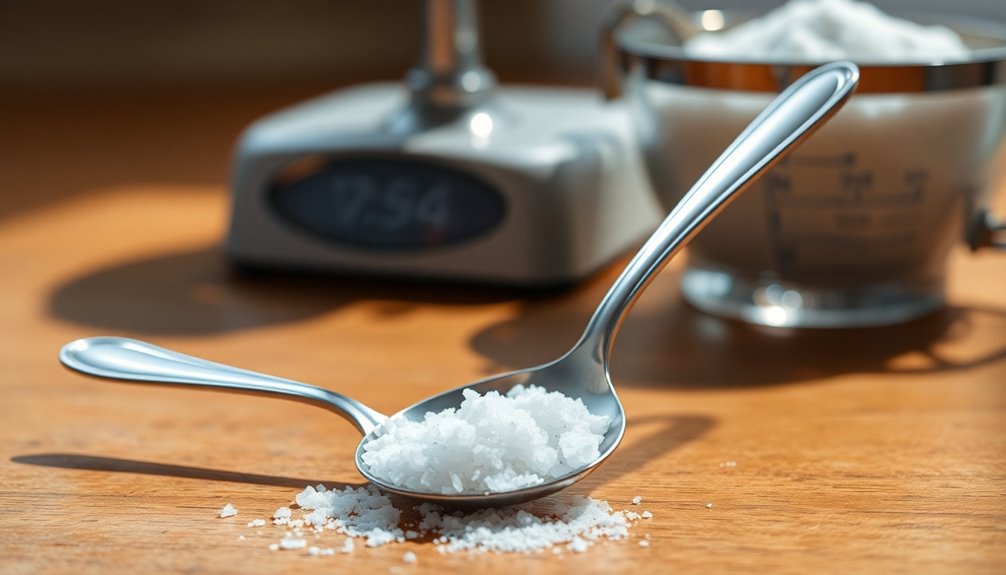
When you're measuring salt for a recipe, it's crucial to understand how teaspoons work, especially since they're a common volume unit in cooking.
Teaspoons are often used to guarantee you get the right amount of salt, but keep in mind that the weight of salt can vary considerably depending on its type. For instance, kosher salt and table salt differ in density, affecting how much weighs in a teaspoon.
To maintain consistency, always use leveled teaspoons instead of heaped ones. This practice not only helps in achieving accurate measurements but also allows you to manage your sodium intake effectively.
Weight of One Half Teaspoon
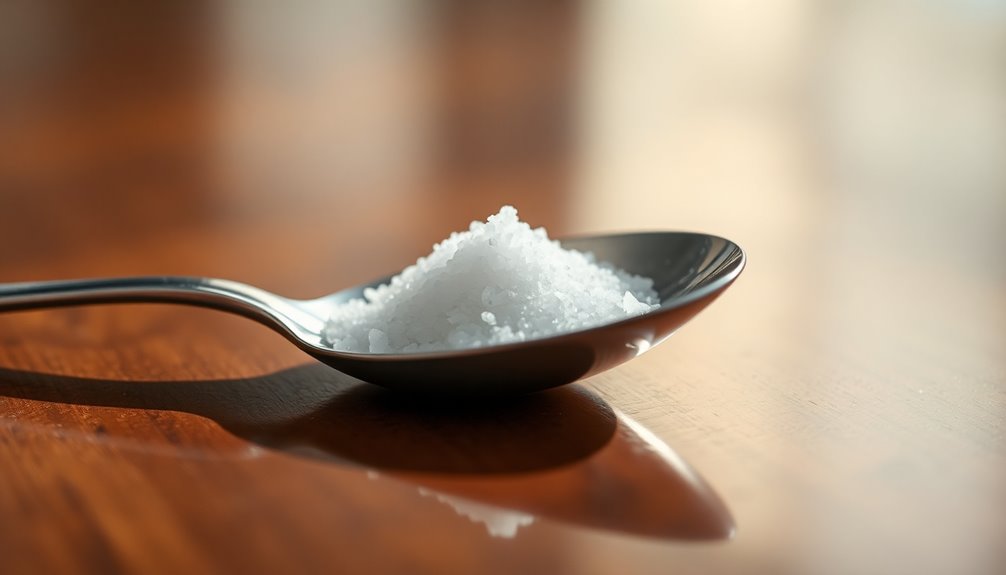
A half teaspoon of salt typically weighs about 2.84 grams, depending on the type of salt you're using.
The weight of salt can vary considerably; for example, table salt is denser than kosher salt. If you're using kosher salt like Diamond Crystal, that same 1/2 teaspoon might weigh around 1.5 to 2 grams.
On the other hand, Morton kosher salt can weigh about 3 grams.
It's crucial to measure accurately, as different salts have varying crystal sizes and densities that affect weight.
For the best results in your cooking, consider using a kitchen scale to convert teaspoons to grams, ensuring you get the right amount every time.
Conversion From Teaspoons to Grams
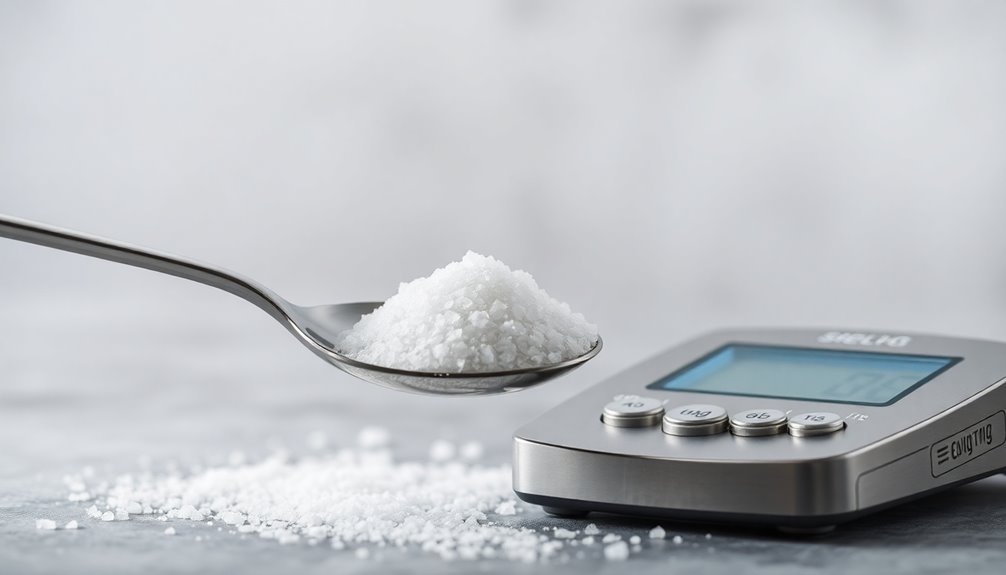
When you're cooking, knowing how to convert teaspoons to grams is crucial for accurate measurements.
For instance, half a teaspoon of salt weighs about 2.845 grams, which can really affect the taste of your dish.
Using weight instead of volume helps guarantee consistency and better results every time.
Teaspoon to Gram Conversion
To accurately convert teaspoons to grams, you'll want to use a straightforward formula that simplifies the process. The conversion formula is grams = teaspoons × 5.69.
For instance, if you measure one half teaspoon (1/2 tsp) of salt, you simply multiply 0.5 by 5.69, resulting in approximately 2.85 grams.
This knowledge is vital since different types of salt can vary in density, affecting their weight in teaspoons.
To achieve precise measurements in your cooking, consider using a kitchen scale to weigh salt in grams. This approach guarantees consistency in your recipes and helps prevent the risk of over-salting, leading to better overall results in your dishes.
Accurate Salt Measurement Techniques
Accurate salt measurement techniques are key for achieving the desired flavor in your dishes. To make certain you get the accurate measurement of salt, use a digital scale whenever possible. This is especially important since different types of salt, like table salt and kosher salt, vary in density. Familiarizing yourself with a conversion table will help you convert teaspoons to grams easily.
| Teaspoon Measurement | Grams (Approx.) | Type of Salt |
|---|---|---|
| 1/2 tsp | 2.845 g | Table Salt |
| 1 tsp | 5.69 g | Table Salt |
| 1 tsp | 6.5 g | Kosher Salt |
Using this table guarantees you measure accurately, enhancing your cooking experience.
Importance of Consistency
While precise measurements may seem trivial, consistency in converting teaspoons to grams is vital for achieving culinary success. Here are four key reasons why you should focus on this:
- Different salts have varying densities, affecting their weight.
- Using a kitchen scale guarantees accurate salt measurements.
- Conversion tables simplify the process of Salt to Grams.
- Precise measurements assure the intended flavor and texture of your dishes.
When you maintain consistency in measuring salt, you enhance recipe fidelity and avoid flavor mishaps. Additionally, understanding the importance of butter can further elevate your culinary creations by providing richness and depth to your dishes.
Types of Salt and Their Weights
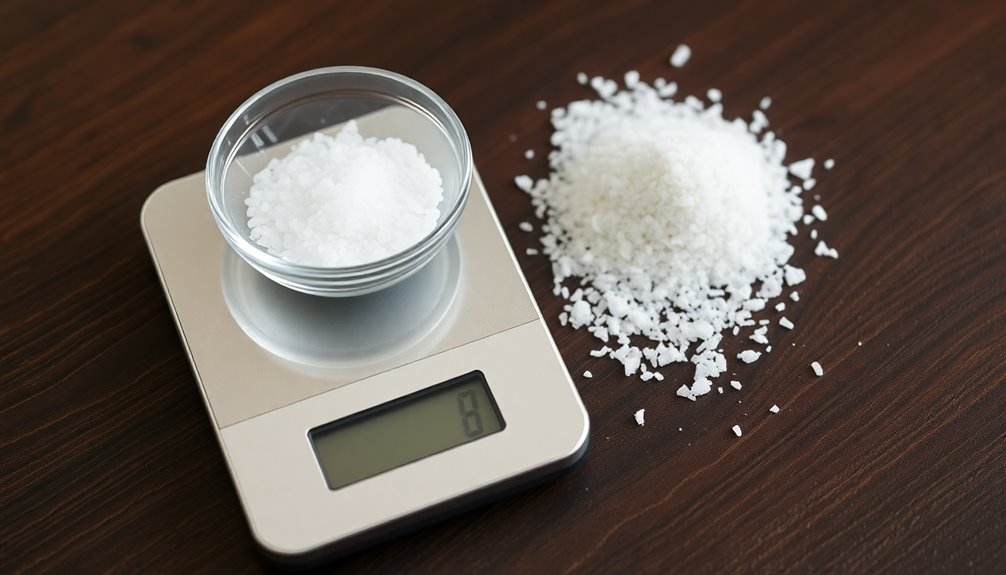
When it comes to measuring salt, the type you choose can greatly impact the weight of half a teaspoon.
For instance, a teaspoon of table salt weighs about 3.5 grams due to its fine granules. In contrast, kosher salt, with its larger crystals, typically weighs between 2 to 3 grams.
Sea salt varies even more, generally weighing between 2 to 4 grams, depending on the brand and specific type. Iodized salt, a common household choice, weighs approximately 3 grams, similar to table salt.
Specialty salts like Himalayan pink salt can weigh around 3 to 4 grams for half a teaspoon, influenced by their unique crystal sizes and densities.
Understanding these differences can help you achieve accurate measurements.
Culinary Importance of Accurate Measurements
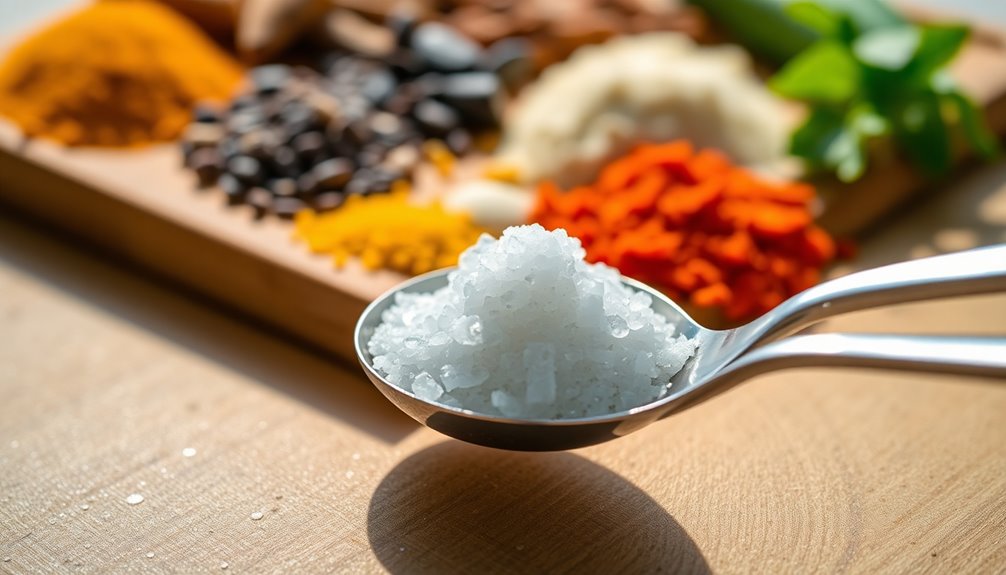
Understanding the weight of different types of salt not only helps with precise measurements but also highlights the culinary importance of getting it right.
Here are four reasons why accurate measurements matter:
- Flavor Balance: Even a slight variation can change the taste of your dish.
- Texture Consistency: Recipes require specific salt amounts for the right texture.
- Recipe Adaptation: Knowing the weight in grams allows you to effectively substitute salts.
- Enhanced Cooking Skills: Mastering measurements improves your overall cooking confidence.
When you measure salt accurately—like knowing that one half teaspoon weighs about 2.84 grams—you create dishes that shine.
Health Considerations With Salt Intake
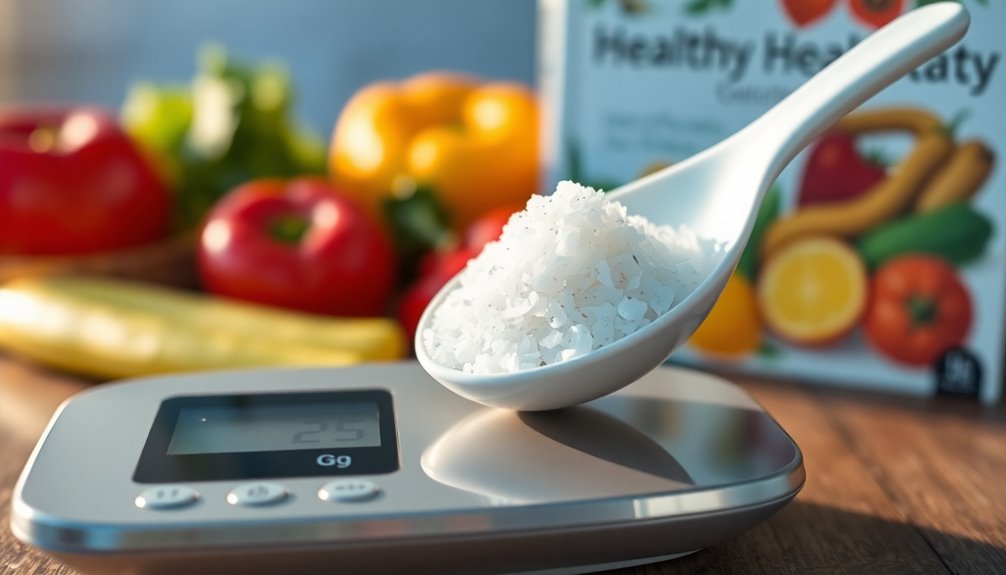
When it comes to salt intake, you should be aware of the recommended daily limit of 2,300 mg, ideally aiming for around 1,500 mg to support heart health.
Consuming too much sodium can lead to serious health risks, including hypertension and kidney issues.
It's also important to take into account iodine levels, as iodized salt plays a vital role in maintaining thyroid function.
Recommended Sodium Intake
Maintaining a healthy sodium intake is vital for your overall well-being. The recommended sodium intake for most adults is less than 2,300 mg daily, ideally around 1,500 mg.
Here are some key points to reflect on:
- One teaspoon of table salt contains about 2,300 mg of sodium.
- Half a teaspoon equals roughly 1,150 mg, which is a significant portion of your daily limit.
- High sodium levels can increase the risk of hypertension and cardiovascular issues.
- Low-sodium options are available to help manage your intake.
Being aware of the amount of salt in your diet, especially from processed foods, is essential for maintaining a healthy lifestyle and preventing future health problems related to excessive sodium intake.
Health Risks of Excess
Excessive salt consumption poses serious health risks that can affect your heart and overall well-being. High sodium diets can lead to hypertension, increasing your chances of developing cardiovascular diseases, which may result in heart attacks and strokes.
The American Heart Association recommends keeping your daily sodium intake below 2,300 mg, with an ideal target of 1,500 mg for peak heart health.
Furthermore, excessive salt intake can cause fluid retention, leading to swelling and discomfort, particularly if you have pre-existing conditions like kidney disease or heart failure.
Regularly consuming high-sodium foods can also disrupt your electrolyte balance, which negatively impacts muscle function and overall health.
Being mindful of your salt intake is vital to maintaining your well-being.
Iodine and Thyroid Health
While you might be mindful of your salt intake for health reasons, it's important to reflect on how iodine, a key nutrient found in iodized salt, plays a fundamental role in thyroid health.
Here are some essential facts to contemplate:
- Iodine is essential for producing thyroid hormones.
- The recommended daily intake for adults is about 150 micrograms.
- Iodized salt can greatly contribute to your iodine needs.
- Insufficient iodine can lead to thyroid disorders like hypothyroidism.
Frequently Asked Questions
How Much Does 1/2 Tsp of Salt Weigh?
When you measure out 1/2 teaspoon of salt, the weight can vary depending on the type of salt you're using.
For fine table salt, you'll find it weighs about 2.84 grams. However, if you're using coarse salts like kosher salt, the weight might be lower—around 1.5 grams for Diamond Crystal.
To get the most accurate measurement, it's best to use a kitchen scale, especially when precision matters in your cooking.
How Much Is a Half Teaspoon of Salt?
Did you know that just half a teaspoon of salt can enhance the flavor of an entire dish?
When you're measuring out a half teaspoon of salt, you're really capturing a little burst of flavor that can transform your cooking.
It’s essential to use a level teaspoon for accuracy, as even a small difference can affect your meal. When measuring ingredients, precision is key to achieving the intended flavors and textures in your dish. For instance, when brewing yerba mate, the amount of tea leaves used can alter the yerba mate caffeine duration, potentially leading to unexpected effects. Therefore, always ensure your measurements are consistent to enjoy a delightful culinary experience.
How Many Grams Is 1/2 Tsp?
When you're measuring salt, you might wonder how many grams are in 1/2 teaspoon. It's about 2.84 grams.
Keep in mind that this weight can vary based on the type of salt and how finely it's ground.
To get the most accurate measurement, consider using a kitchen scale. This way, you guarantee your recipes turn out just right and help manage your sodium intake effectively while cooking.
How Much Is 2g of Salt in Teaspoons?
Did you know that the average American consumes about 3,400 mg of sodium daily, far exceeding the recommended limit?
If you've got 2 grams of salt, it's roughly 0.35 teaspoons. To find this, just divide the grams by 5.69, the weight of a teaspoon of salt.
Measuring accurately is essential for your recipes and dietary needs, so knowing this conversion can help you maintain that perfect balance in your cooking!
Conclusion
In cooking, measuring salt is as essential as tuning an instrument before a concert. One half teaspoon of salt typically weighs around 3 grams, but this can vary depending on the type of salt you're using. Whether it's table salt, kosher salt, or sea salt, knowing these details can elevate your culinary creations. Remember, precision matters in both flavor and health, so keep an eye on those measurements to strike the perfect balance in your dishes!









